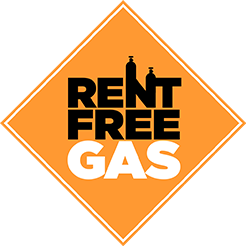What is MIG and what does it mean?
MIG stands for Metal Inert Gas. This is a commonly used term in the Welding industry in Australia. MIG Gas refers to a gas that is inert (inert means ‘still’) and when we use that word (‘inert’) with gas it implies that the gas is inactive or non-reactive. So that gas, such as Argon, can be used in the process and not react with the other elements. The MIG Gas is used as a shielding gas to prevent Oxygen and moisture from getting into the weld.
MIG Gas Mixtures
The most common MIG gas supplied in Australia is a blend of Argon, Carbon Dioxide and Oxygen and this mixtures of the gases vary. There is normally a high concentration of Argon 92-95% with the remaining gas mixture mostly carbon dioxide (3-5%), with a low percentage of Oxygen (1-3%).
The MIG gas mixture we supply is 93% Argon, 5% Carbon dioxide and 2% Oxygen.
MIG gas advantages
Welding with MIG gas is great, because:
- Welding a large number of metals and thicknesses is easy
- The welt bead is good
- Weld splatter is minimised
- Welding with MIG gas is easy to learn and master.
MIG gas disadvantages
- Welding with MIG gas can be limited for very thick metal
- MIG gas welding is less portable than arc welding
- The weld is slightly less controlled than TIG welding.
If you have not welded previously or are getting back into the game, remember it is best to seek advice and guidance first. The key areas of interest, are what type of metal are you welding? how thick is it? what is the best Gas for this process? have I got the right equipment? and then always do a test run. Doing some research on the how to hold the welding torch, and the angle, as well as watching some Youtube videos might also be a good idea.
Happy welding.

